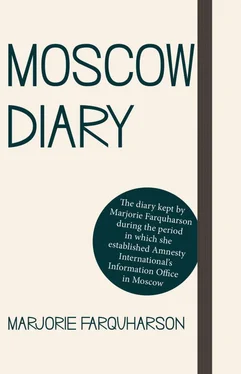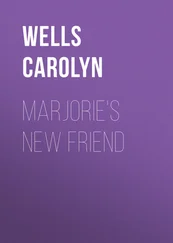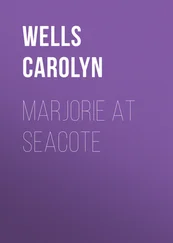Helena had wanted to meet Andrey, so he came round for dinner. Here began another unexpected awkwardness. She was telling him about her old job, and how human rights groups used to compete for funds to do projects in South Africa. Andrey said, “Why?”, and I watched the cultural gap open between them and never close. Helena was furious, but too polite to argue and also sorry not to be getting on with a friend of mine. Andrey didn’t mind if they got on or not, and that too was a cultural difference. I realised it is marvellous having Russian friends, but it has never been painless.
Tuesday 17 March
Big tension was expected in Moscow today, as members of the old Soviet Parliament assembled to agitate for a return to the old USSR. Although I saw red flags and some knots of people outside the Moskva Hotel, they were smaller than the crowds selling shoes and shirts round the corner at Kuznetsky Most. Moscow’s becoming like New York. If you’ve got the money you can buy champagne at 6.00am and a jumper at 11.00pm. You see huge throngs in the street, which last year would have been a pro-Yeltsin gaggle. This year it is traders standing in lines along the pavements with pedestrians slowly moving through, trying on this or beating down the prices for that. The bottom of Gorky Street, Kuznetsky Most and the Lubyanka are almost impassable. It is certainly good to see cheese – and different varieties too – beer, and wines up from Tajikistan and Karabakh. There was nothing like it last year.
Today I was supposed to meet the paranoid man again in the office, but would you believe it the telephone engineers decided to install our phone there today. Tolya asked them to postpone it, to save the man’s nerves.
There’s a settlement of Old Believers’ Churches just east of Taganka – the Rogozhsky settlement – and this morning Misha Roshchin, a Quaker who is also an Old Believer, took Helena and me round it. They had refused to accept new church rulings in the 1500s, in particular the introduction of crossing yourself with three fingers not two. Hard to believe, but true, and they and their clergy went through years of persecution because of it.
The church was absolutely beautiful. They have kept to the old canons of icon painting and do not use electricity, so have a splendid eighty-four-piece candelabra in burnished metal hanging before the altar. There is a massive wooden scaffold on wheels which they use for lighting the candles. A woman was lovingly sweeping the wooden floor and other old ladies were sitting in the peace and quiet in the sunlight which was streaming in through the windows.
I was quite entranced by the sense of devotion, until a thin old lady in felt boots marched across the church at a fair clip, crossed herself profusely en route past the icons, and screamed that she’d seen me holding my hands behind my back. I begged her forgiveness and she said, “The Lord may forgive you”, but there again he might not. Helena, who was lounging by some shroud, smartened herself up pretty sharpish.
At night I sat between Andrey and Helena at an organ concert, by this time neither of them making much attempt to be friendly with each other. From the back view the organist looked as though he was breakdancing during the complicated bits. As we parted Andrey gave me beetroots and homemade cake from his briefcase. I think that’s the thing about friendships here. You don’t get to know someone through conversation, so much as going through similar problems and helping each other. Conversation comes later. If Helena lived here I think she and Andrey would get on quite differently.
Wednesday 18 March
Today I decided to get our certificate from the Health and Safety people, whatever it took. Yesterday I’d gone for a preliminary recce to the Health Department where, after bawling me out, a woman said quite reasonably, “You know, we’re under no obligation to give you one, we’ve a thousand other things to do.” “Well, why are we under an obligation to get one then?” I asked. “Because it’s a stupid system and totally stuck in a rut,” she said. She reckoned it would take us a month to get it.
Today I went to the Chief Doctor’s office at Kuznetsky Most, where I had first registered our application. There were two receptionists – a man and a woman – sitting in white coats, and one other client sitting in silence. I asked the woman if she could check the register to see what stage our certification has reached. She went barmy and shrieked that it was a waste of her time. I said quietly that it was a waste of my time if she didn’t, and an electric charge went through the room. I said I was prepared to wait, got out my Izvestiya and read it for forty minutes, aware out of the corner of my eye that her nerve was beginning to crack. She rang someone about me and said, “She’s sitting here, as bold as brass…”, and then finally she looked up her blasted register and told me the certificate was across town at their Taganka office, waiting to be typed.
I went over there and found the very nice solitary secretary sitting in the basement, who immediately whipped out her paper and typed up our certificate there and then. Back to Kuznetsky Most, where by this time the woman receptionist had gone and I was treated to the old man, who breathed heavily through his mouth and whispered as he wrote. Still the silence reigned, although I heard him tell a new client that it was pandemonium: they were “never off the phone” and there was “a constant stream” of people coming to see them. True, the phone did ring once while I was there and the old man answered, “Rats? They’re not us! Ring so and so.”
He told me the Chief Doctor was out and would be back very, very late, maybe about 7.00pm. I took out Izvestiya and said I would wait. In fact she was back in about twenty minutes, spent half an hour giggling with her pal, then signed and stamped my certificate. She was young and the office was heavy with the smell of flowers – obviously a bribeworthy person.
All this took over four hours and it’s hard to keep in mind that it has anything to do with human rights. It is also hard to be human and reasonable with people who are only doing their jobs, while at the same time you feel utter contempt for the system, the work and the aggressive, cowardly and lazy attitude it breeds.
Helena and I went to see The Cherry Orchard at the Moscow Arts Theatre. Shcherbakov, the main actor, had died and there were flowers laid on the windowsills, and a short, moving tribute to him at the start. The British actress Caroline Blakiston was playing the governess, and although she had a tiny part, it became her show, as though she was the compère in Cabaret . Extraordinary and not really a success.
Thursday 19 March
Today was a very beautiful spring morning and I took Helena down to the Kolomenskoye monastery and then to the lovely icon exhibition at the Tretyakov Gallery. We came back, lazed and bathed, then I took her up to the station in time for her night train to St Petersburg.
Tolya has managed against the odds to get the ground plans of our neighbours’ offices for the electricity cabling, but the Electricity Board has said it will not give us our certificate for a month. So we can’t get our furniture from London, we can’t get our rent agreement and the order on our premises, and I learned today that the professor who was supposed to be my sparring partner has backed out of the death penalty round table with Sovetskaya Justitsiya . Apparently he doesn’t want to go public and in particular does not want to argue with a foreigner. Since we would have been arguing in Russian, I should have thought he would be at an advantage. This last six-week stint is turning out disappointingly anti-climactic.
Читать дальше












